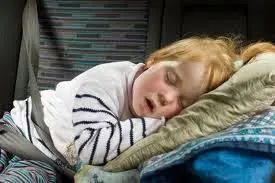In most cases, a baby that snores, snorts, and even drips snot is not unusual as nasal passages are still developing, but less parents are prepared for toddler snoring. Whether your toddler has sawed logs from night one or it’s a new a noisy development, there are some things that should be known about toddler snoring.
What causes toddler snoring?
A toddler snoring can occur for a number of reasons. Some of which are no cause for concern, and some that warrant some pediatrician attention.
First, your toddler could just be congested.
Any obstruction of the nasal passages can cause toddler snoring. If your toddler suddenly becomes the loudest sleeper of them all, it’s a good bet snots to blame. He or she may have a cold coming on or just need a good booger sucking. Older toddlers can also be taught to blow their own nose to avoid that midnight rendezvous with an aspirator no parent enjoys. A humidifier by your child’s bed may also prove helpful or administering steam baths just before bed. Swollen tonsils will also cause toddler snoring in many cases.
If the snoring isn’t new it could still be congestion, but it may be the result of an allergy. Pet and seasonal allergies both are common even in little tykes. You can try eliminating common triggers one at a time on trial basis and see what happens or talk with your pediatrician about getting an allergy medication.
Another possible cause of lifelong little snorers is a deviated septum, meaning an irregularity in the nasal passage. This, of course, would require a medical opinion which would come with expert advice on treatment.
Finally, saving the most dangerous but less common cause of toddler snoring for last, it could also be sleep apnea, a disorder that causes disrupted sleep. You may or may not notice this at an early age. In many cases, sleep apnea does not onset until age 3 to 6. Sleep apnea can be caused by an obstruction preventing proper respiration, a neurological issue where the brain fails to signal the muscles to breathe, or a combination of both. Kids with sleep apnea usually also have trouble sleeping, wake often, are restless, can be heard struggling to breathe in their sleep, and may wake seemingly still sleepy. They may also suffer other sleep disturbances such as night terrors. In most cases, sleep apnea can be treated, but does require prompt medical attention. Untreated sleep apnea can lead to developmental long-term effects.
What can you do about toddler snoring?
If your toddler has been snoring since birth, it’s recommended you just bring it up to your pediatrician to have it checked out. If the snoring is new and your child is showing other signs of sickness, chances are its just a congestion issue. Treat for a cold and keep an eye on it, if it becomes a long-term issue or your child becomes increasingly ill, see your pediatrician.
You may also enjoy:
All About Toddler Nightmares and Night Terrors
Melatonin for Kids: Is it Safe?

